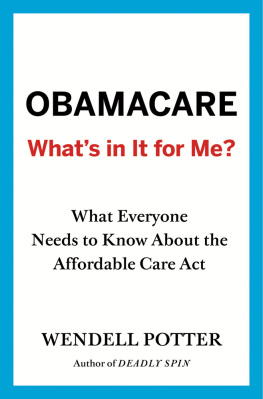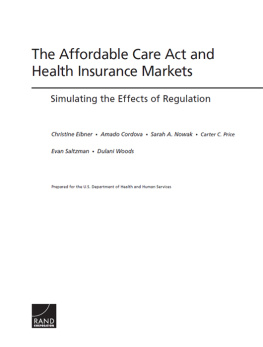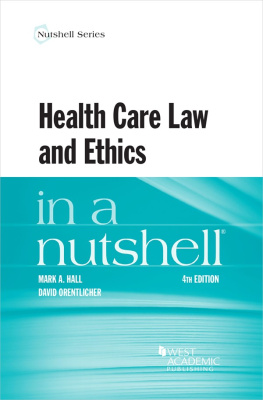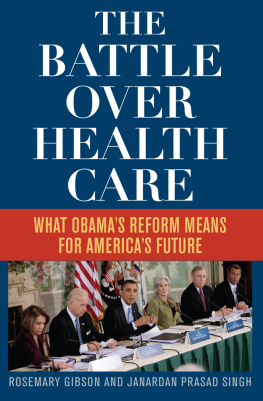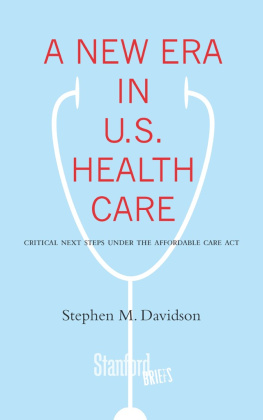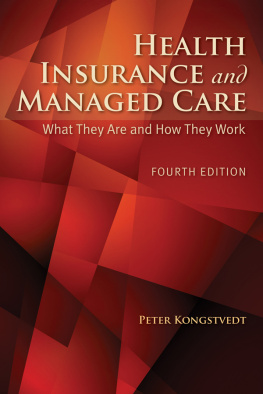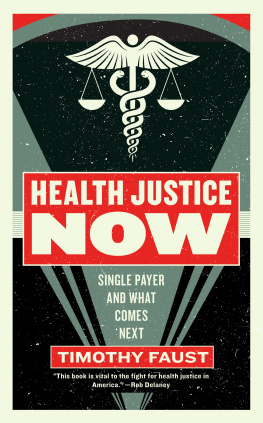NO BENEFIT
No Benefit
Crisis in America's Health Insurance Industry
Lawrence D. Weiss
First published 1992 by Westview Press
Published 2018 by Routledge
52 Vanderbilt Avenue, New York, NY 10017
2 Park Square, Milton Park, Abingdon, Oxon OX14 4RN
Routledge is an imprint of the Taylor & Francis Group, an informa business
Copyright 1992 by Lawrence D. Weiss
All rights reserved. No part of this book may be reprinted or reproduced or utilised in any form or by any electronic, mechanical, or other means, now known or hereafter invented, including photocopying and recording, or in any information storage or retrieval system, without permission in writing from the publishers.
Notice:
Product or corporate names may be trademarks or registered trademarks, and are used only for identification and explanation without intent to infringe.
Library of Congress Cataloging-in-Publication Data
Weiss, Lawrence David.
No benefit: crisis in America's health insurance industry /
Lawrence D. Weiss.
p. cm.
Includes bibliographical references and index.
ISBN 0-8133-1215-9
1. Insurance, HealthUnited States. 2. Medical care, Cost of
United States. I. Title.
[DNLM: 1. Delivery of Health CareeconomicsUnited States.
2. Health PolicyeconomicsUnited States. 3. Insurance, Health
economicsUnited States. w 275 AA1 W42n]
HG9396.W45 1992
368.3'82'00973dc20
DNLM/DLC
for Library of Congress 92-18113
CIP
ISBN 13: 978-0-367-00370-8 (hbk)
To all those who have suffered or died as victims of a health care system dedicated to maximum profit rather than universal access
How I came to write this book is something of an irony. One day just four or five years ago I was reading the Anchorage Daily News, my hometown newspaper, and I happened upon a short article in the business section. The gist of the article was that in the previous year the cost of health care services and commodities had risen by some percentageabout 9 or 10 percent. A few weeks later I ran across another brief article in the business section of the News. This article noted that in the same year, health insurance premiums had increased by a much larger percentage, perhaps 20 or 30 percent (I don't recall now). In any case this struck me as very odd indeed. A quick check in the United States Statistical Abstract and one or two other sources verified that this appeared to be a common pattern over time.
If the cost of health insurance premiums is pegged to the cost of health care services and commodities, I thought, why had the cost of health insurance premiums escalated at a rate two or three times higher than the cost of health care itself? And if the cost of health insurance is not bound closely to the cost of health care, then what does determine the cost of health insurance? That simple quandary nagged at me with unrelenting persistence because of the social importance of the dramatically rising cost of health insurance premiums. The consequences of this have wreaked havoc with the lives of millions of families across the United States. The slashing of health benefits has been a major cause of strike activity for several years. Unpaid medical bills have become the most common cause of recent personal bankruptcies. Tens of millions of residents have little or no access to health care in the United States, and their numbers increase alarmingly every year. This is a fundamental national social problem with dire consequences for the American people.
With some hesitation I tentatively began to probe the baffling and esoteric world of private health insurance. Perhaps the first surprise I encountered early in my research was that there was no book-length critical analysis of the health insurance industry. There were books about life insurance or insurance in general, insurance textbooks, and life/health insurance statistical reference books, but no critical book-length analysis of the health insurance industry. This lack of readily available information forced me to dig deeper than I had originally intended. After all, I started out to answer what I initially thought was a straightforward question. The irony is that to this day I have not adequately answered the original question I posed to myself, although I now believe annual variations in the cost of health insurance premiums are tied more closely to industry investment strategies rather than to variations in the cost of health care. Nevertheless, as my research progressed I came to realize that the issue of health insurance was far more encompassing and far more significant than I ever imagined. I had begun to piece together an enormous tapestryan industry with threads entwining the lives of every resident in the United States. I began to understand this emerging creation as a portrayal of the social consequences of private health insurance. As the panorama of wasteful, brutal, and inhumane social consequences grew and unfolded before me, it became clear that this was indeed an industry with no benefit. I felt it was important to share these findings with everyone struggling to create a national health care system equally accessible to all.
Finally, I would like to acknowledge just a few of the people who supported me during the stressful and lengthy process of theoretical formulation, research, and writing that ultimately resulted in this book. Dr. Frank Goldsmith encouraged my research and sent me volumes of data. Dr. Tom Bodenhiemer's brilliant work in this field inspired me. The late Ben Riskin documented in writing during his last weeks of life important information about the historic role of labor in the struggle for national health care. Dr. John Booker remained a close friend and colleague despite my inability for a couple of years to discuss anything except the health insurance industry. Dean Wayne Miller and Chairperson Jack Peterson supported faculty research and helped me find the resources to do it. Carlette Ivory gave timely and cheerful clerical support. The staff at the Health Sciences and Consortium Libraries at the University of Alaska-Anchorage were very helpful. Dean Birkenkamp and Jim Fieser at Westview Press recognized the value of this work and supported me fully throughout the process. Lastly, I thank my dear wife, Christy Smith, who listened politely and did not seek a divorce despite innumerable one-sided dinnertime discussions about the health insurance industry.
Lawrence D. Weiss
chapter one
Placing the Social Fact of Private Health Insurance in Perspective
In the United States having or not having adequate private health insurance has become synonymous with having or not having adequate access to health care. The health insurance industry has been desperately seeking to keep the association between private insurance and access inseparable in the public's mind. It is, however, a spurious and demonstrably harmful association. The Organization for Economic Cooperation and Development (OECD) is composed of twenty-two countries, including most of Europe, Japan, Canada, the United States, New Zealand, and Australia. Most of these countries have virtually no commercial private health insurance industry. Data from 1986 indicate that compared with these industrialized nations of the world the United States ranked first in average per capita spending on health care. According to George J. Schieber, director of the Office of Research, Health Care Financing Administration: "Spending in the United States was 38 percent higher than Canada, the second highest country; 49 percent higher than Sweden, the third highest country; 184 percent higher than the United Kingdom, the 17th ranked country; and 600 percent higher than Greece, the last ranked country" (U.S. Congress 1989e, 24).


